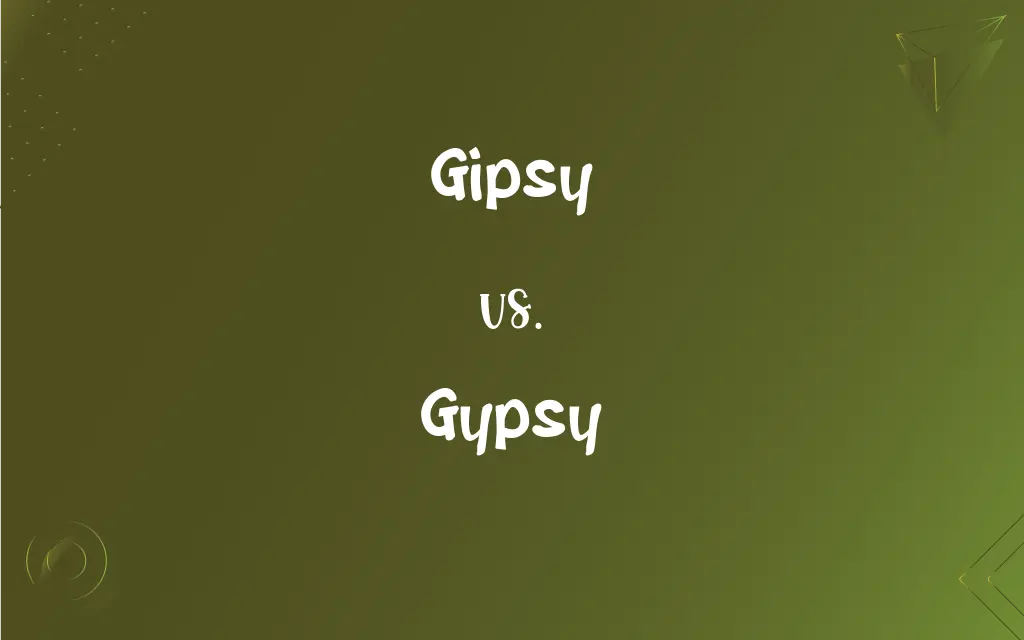Gipsy vs. Gypsy: What's the Difference?
By Harlon Moss & Janet White || Updated on May 20, 2024
Gipsy and Gypsy refer to the same ethnic group traditionally known as the Romani people, with Gypsy being the more common spelling in American English and Gipsy being an older or less common variant.

Key Differences
Gipsy and Gypsy both denote the Romani people, an ethnic group with origins in Northern India, who have a history of nomadic lifestyle. The spelling "Gypsy" is more widely accepted and used in modern American English, while "Gipsy" is an older or less common variant.
Gypsy is the contemporary and preferred spelling, especially in American and British English. It is used in most modern texts, literature, and official documents to refer to the Romani people or their cultural practices.
Gipsy, though less common today, can still be found in older literature and historical documents. It was used more frequently in the past but has largely been replaced by the spelling Gypsy in modern usage.
Both terms can carry pejorative connotations if used carelessly, as they have historically been associated with stereotypes and discrimination. It is increasingly preferred to use "Romani" or "Roma" to refer to the ethnic group respectfully.
In daily use, Gypsy is more recognizable and understood, whereas Gipsy might be encountered in historical contexts or specific regional uses. Both spellings refer to the same group but differ mainly in historical and regional usage.
ADVERTISEMENT
Understanding the distinction between Gipsy and Gypsy is important for cultural sensitivity and accurate communication, especially in written and formal contexts.
Comparison Chart
Definition
Refers to the Romani people
Refers to the Romani people
Spelling Usage
Older or less common variant
Modern and widely accepted spelling
Common Contexts
Historical texts, older literature
Modern texts, everyday usage
Connotations
Can be considered outdated
Preferred contemporary term
ADVERTISEMENT
Cultural Sensitivity
Less common, but same sensitivities
More common, same sensitivities
Gipsy and Gypsy Definitions
Gipsy
An archaic variant of Gypsy.
Historical documents often used the spelling Gipsy.
Gypsy
Refers to someone perceived as having a free-spirited or nomadic lifestyle.
She lived a Gypsy life, traveling the world.
Gipsy
Used in older English literature.
The poem described a Gipsy camp under the stars.
Gypsy
Commonly used in contemporary texts and media.
The movie depicted the life of a Gypsy family.
Gipsy
An older spelling for the Romani people.
The novel from the 19th century referred to the travelers as Gipsies.
Gypsy
The modern spelling for the Romani people.
The Gypsy community held a vibrant cultural festival.
Gipsy
A term for someone with a nomadic lifestyle (dated usage).
The Gipsy caravans moved from town to town.
Gypsy
Increasingly recognized as having potential pejorative use.
It's better to refer to them as Romani to avoid the term Gypsy.
Gipsy
Can still be found in regional dialects.
In some regions, people still use the term Gipsy.
Gypsy
Widely understood in both American and British English.
The Gypsy music added a lively touch to the event.
Gipsy
Variant of Gypsy.
Gypsy
See Romani.
Gipsy
Alternative spelling of gypsy
Gypsy
The Romani language.
Gipsy
Alternative spelling of gypsy
Gypsy
A member of any of various traditionally itinerant groups unrelated to the Romani.
Gipsy
See Gypsy.
Gypsy
A part-time or temporary member of a college faculty.
Gipsy
A member of a nomadic people originating in northern India and now living on all continents
Gypsy
A member of the chorus line in a theater production.
Gypsy
Alternative form of Gypsy: a member of the Romani people.
Gypsy
(colloquial) An itinerant person or any person, not necessarily Romani; a tinker, a traveller or a carny.
Gypsy
A move in contra dancing in which two dancers walk in a circle around each other while maintaining eye contact (but not touching as in a swing). whole gyp, half gyp, and gypsy meltdown, in which this step precedes a swing.}}
Gypsy
(theater) A member of a Broadway musical chorus line.
Gypsy
(dated) A person with a dark complexion.
Gypsy
(dated) A sly, roguish woman.
Gypsy
Alternative form of Gypsy: of or belonging to the Romani people.
Gypsy
(offensive) Of or having the qualities of an itinerant person or group with qualities traditionally ascribed to Romani people; making a living from dishonest practices or theft etc.
Gypsy
(intransitive) To roam around the country like a gypsy.
Gypsy
To perform the gypsy step in contra dancing.
Gypsy
One of a vagabond race, whose tribes, coming originally from India, entered Europe in the 14th or 15th century, and are now scattered over Turkey, Russia, Hungary, Spain, England, etc., living by theft, fortune telling, horsejockeying, tinkering, etc. Cf. Bohemian, Romany.
Like a right gypsy, hath, at fast and loose,Beguiled me to the very heart of loss.
Gypsy
The language used by the gypsies.
Gypsy
A dark-complexioned person.
Gypsy
A cunning or crafty person.
Gypsy
Pertaining to, or suitable for, gypsies.
Gypsy
To play the gypsy; to picnic in the woods.
Gypsy
A member of a nomadic people originating in northern India and now living on all continents
Gypsy
The Indic language of the Gypsies
FAQs
What is the difference between Gipsy and Gypsy?
Gipsy is an older or less common spelling, while Gypsy is the modern and widely accepted spelling.
Which spelling is more common today, Gipsy or Gypsy?
Gypsy is the more common and accepted spelling in modern English.
Can both Gipsy and Gypsy be used interchangeably?
Yes, but Gypsy is preferred in contemporary usage, while Gipsy may appear in older texts.
Are there any contexts where Gipsy is still commonly used?
Mostly in historical or literary contexts; Gypsy is preferred today.
Why is Gypsy considered potentially pejorative?
It has been associated with stereotypes and discrimination against the Romani people.
Where might I encounter the spelling Gipsy?
In historical documents, older literature, or specific regional dialects.
How can I refer to the Romani people respectfully?
Using "Romani" or "Roma" is more respectful and accurate.
Why is there a spelling variation between Gipsy and Gypsy?
The variation is historical, with Gypsy becoming the dominant form.
Is one term considered more respectful than the other?
Both terms can be sensitive, but using "Romani" or "Roma" is more respectful.
Are there cultural sensitivities associated with using Gypsy?
Yes, due to historical stereotypes and discrimination.
What does Gypsy mean in modern usage?
It refers to the Romani people or a free-spirited, nomadic lifestyle.
Is Gipsy used in American English?
It's less common; Gypsy is the preferred spelling in American English.
Is Gypsy used in British English?
Yes, Gypsy is also the preferred spelling in British English.
Can Gipsy still be found in modern texts?
Rarely; it's mostly seen in older texts.
What is the origin of the term Gypsy?
It derives from the mistaken belief that Romani people came from Egypt.
What is the adjective form of Gypsy?
Gypsy, as in "Gypsy culture" or "Gypsy lifestyle."
Is it okay to use Gypsy in fiction?
Yes, but be mindful of cultural sensitivity and context.
Is it accurate to use Gypsy for anyone with a nomadic lifestyle?
It's better to specify "nomadic" to avoid cultural insensitivity.
How do the Romani people prefer to be identified?
As Romani or Roma, which are respectful and accurate terms.
Does the term Gypsy refer exclusively to the Romani people?
Primarily, but it can also describe a nomadic lifestyle.
About Author
Written by
Harlon MossHarlon is a seasoned quality moderator and accomplished content writer for Difference Wiki. An alumnus of the prestigious University of California, he earned his degree in Computer Science. Leveraging his academic background, Harlon brings a meticulous and informed perspective to his work, ensuring content accuracy and excellence.
Co-written by
Janet WhiteJanet White has been an esteemed writer and blogger for Difference Wiki. Holding a Master's degree in Science and Medical Journalism from the prestigious Boston University, she has consistently demonstrated her expertise and passion for her field. When she's not immersed in her work, Janet relishes her time exercising, delving into a good book, and cherishing moments with friends and family.































































